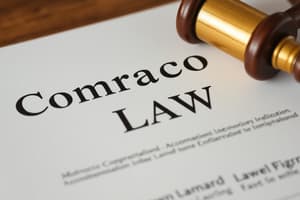Podcast
Questions and Answers
What defines an international commercial transaction?
What defines an international commercial transaction?
- Involvement of parties from the same country
- Crossing of national borders by goods, services, or financial elements (correct)
- Transactions that only exist between international organizations
- Domestic transactions that comply with international law
Which of the following is NOT a characteristic of the World Trade Organization (WTO)?
Which of the following is NOT a characteristic of the World Trade Organization (WTO)?
- It enforces trade agreements among member countries
- Member states can invoke WTO acts directly before their courts (correct)
- It applies its rules when countries engage in international trade
- It allows for varying degrees of sovereignty among nations
What is one major function of Most Favored Nation clauses in international trade?
What is one major function of Most Favored Nation clauses in international trade?
- To establish tariffs on imports from particular countries
- To ensure one country is favored over all others
- To guarantee equal treatment among all countries in trade agreements (correct)
- To create binding regulations directly applicable in member states
How does the EU differ from the WTO regarding sovereignty?
How does the EU differ from the WTO regarding sovereignty?
What limitation does the UK system impose on international agreements?
What limitation does the UK system impose on international agreements?
What effect do tariffs generally have on international commerce?
What effect do tariffs generally have on international commerce?
Which major principle of international trade suggests countries will treat one another equally in preferential agreements?
Which major principle of international trade suggests countries will treat one another equally in preferential agreements?
Why might a country not fully adopt international commercial law?
Why might a country not fully adopt international commercial law?
What is a key principle established by the Cassis de Dijon ruling regarding trade restrictions?
What is a key principle established by the Cassis de Dijon ruling regarding trade restrictions?
What does the principle of mutual recognition ensure within the EU?
What does the principle of mutual recognition ensure within the EU?
Which of the following is NOT a principle of UNIDROIT?
Which of the following is NOT a principle of UNIDROIT?
What kind of competition does the WTO's anti-dumping agreement aim to prevent?
What kind of competition does the WTO's anti-dumping agreement aim to prevent?
How does the principle of 'good faith and fair dealing' relate to contracts under UNIDROIT?
How does the principle of 'good faith and fair dealing' relate to contracts under UNIDROIT?
What is the main purpose of the WTO's focus on predictability and transparency?
What is the main purpose of the WTO's focus on predictability and transparency?
What does national treatment on taxes and regulations entail?
What does national treatment on taxes and regulations entail?
Which scenario exemplifies 'dumping' in international trade?
Which scenario exemplifies 'dumping' in international trade?
In which case did the European Court of Justice establish the principle of mutual recognition?
In which case did the European Court of Justice establish the principle of mutual recognition?
What economic ideology did the Reagan/Thatcher administration advocate regarding trade?
What economic ideology did the Reagan/Thatcher administration advocate regarding trade?
What is a significant limitation on national regulations as established in the Cassis de Dijon case?
What is a significant limitation on national regulations as established in the Cassis de Dijon case?
Which factor is emphasized in UNIDROIT principles related to party autonomy?
Which factor is emphasized in UNIDROIT principles related to party autonomy?
What was a major outcome of the Cassis de Dijon ruling on product standards in the EU?
What was a major outcome of the Cassis de Dijon ruling on product standards in the EU?
Which of the following illustrates interdependence in international trade agreements?
Which of the following illustrates interdependence in international trade agreements?
Flashcards
What makes a transaction international?
What makes a transaction international?
A commercial transaction becomes international when it involves parties, goods, services, or financial elements that cross national borders.
Comparative advantage
Comparative advantage
The concept that different countries specialize in different goods and services, leading to increased trade, productivity, and overall growth.
The limits of national law
The limits of national law
National laws have limits in international relations and international organizations are needed to regulate beyond national boundaries.
International organizations' autonomy
International organizations' autonomy
Signup and view all the flashcards
Dualist system
Dualist system
Signup and view all the flashcards
Most Favored Nation (MFN)
Most Favored Nation (MFN)
Signup and view all the flashcards
Tariffs and international trade
Tariffs and international trade
Signup and view all the flashcards
Balancing free trade and national values
Balancing free trade and national values
Signup and view all the flashcards
GATT exceptions
GATT exceptions
Signup and view all the flashcards
National treatment on taxes and regulations
National treatment on taxes and regulations
Signup and view all the flashcards
Dumping
Dumping
Signup and view all the flashcards
WTO anti-dumping agreement
WTO anti-dumping agreement
Signup and view all the flashcards
Predictability through binding and transparency
Predictability through binding and transparency
Signup and view all the flashcards
Washington Consensus
Washington Consensus
Signup and view all the flashcards
Mutual recognition (Cassis de Dijon)
Mutual recognition (Cassis de Dijon)
Signup and view all the flashcards
Free market in the EU
Free market in the EU
Signup and view all the flashcards
Cassis de Dijon case
Cassis de Dijon case
Signup and view all the flashcards
UNIDROIT
UNIDROIT
Signup and view all the flashcards
Freedom of contract (UNIDROIT)
Freedom of contract (UNIDROIT)
Signup and view all the flashcards
Binding nature of contracts (UNIDROIT)
Binding nature of contracts (UNIDROIT)
Signup and view all the flashcards
Good faith and fair dealing (UNIDROIT)
Good faith and fair dealing (UNIDROIT)
Signup and view all the flashcards
Reasonableness (UNIDROIT)
Reasonableness (UNIDROIT)
Signup and view all the flashcards
Party autonomy (UNIDROIT)
Party autonomy (UNIDROIT)
Signup and view all the flashcards
Study Notes
International Commercial Law – Lecture 1
-
International Commercial Transaction: A transaction is international if parties, goods, services, or financial elements involve crossing national borders.
-
Comparative Advantage: International commerce fosters commerce, productivity, and growth by allowing specialized production in different countries.
-
National Law Limitations: International commerce requires regulation that transcends national boundaries, raising issues of how different sovereign countries can be regulated.
Institutions of International Character
-
USA, EU, WTO: These entities differ in autonomy. The USA has full sovereignty, while the EU's sovereignty is shared with member nations. The WTO's rules apply only when parties engage in international trade, allowing for more national autonomy.
-
Dualist System (e.g., UK): Domestic laws need separate national enactment for WTO decisions to be binding.
-
Traditional Relationships: Tariffs often hinder international trade.
-
Free Trade Areas: Regional free trade areas like the EU incentivize trade but can raise concerns about trade protectionism.
-
Modern Dilemma: Modern trade balances free trade with preserving national values. WTO rulings aren't directly enforceable in national courts without domestic legislation. EU law has different characteristics in this aspect.
Principles of the World Trade Organization
-
Most-Favored-Nation (MFN): Countries will treat another as well as the country treating other nations as its most-favored partner. This principle has exceptions, allowing for free trade agreements among WTO members and special consideration for developing countries.
-
National Treatment: Products from other countries cannot be treated less favorably regarding regulations than domestic products (e.g., safety standards).
-
Trade Without Discrimination (Fair Competition): WTO anti-dumping efforts address dumping, which is selling products at lower prices than competitors in a targeted market, aiming to create unfair competition against local producers.
-
Predictability & Transparency: WTO members commit to maintaining agreed-upon trade barriers and transparent trade practices. Globalization, interconnectedness, and interdependence create challenges.
Limits of Free Markets
- Washington Consensus: The idea that less commercial regulation strengthens the economy. Yet, there's a current movement towards increased national regulation. This highlights complexities in balancing international trade with national interests.
- Free Market in the EU: EU's free market eliminates tariffs and trade restrictions among members. This can create tension when national standards differ.
Cassis de Dijon Case
- Mutual Recognition: Legally-produced goods in one EU member state can also be sold in others, impacting national regulations.
- Rule of Reason: National regulations can be justified if they serve legitimate public interests, are proportionate, and do not unjustifiably restrict trade. This ruling led to the enforcement of harmonized standards in the EU.
International Commerce & Codification of International Commercial Law
- UNIDROIT Principles: Principles for international commercial contracts, focusing on party autonomy, freedom of contract, and fair dealing. They address aspects like contract enforceability and reasonableness.
- Vienna Convention (CISG): A model law for international sales contracts.
- ICC: The International Chamber of Commerce promotes international trade.
Studying That Suits You
Use AI to generate personalized quizzes and flashcards to suit your learning preferences.



